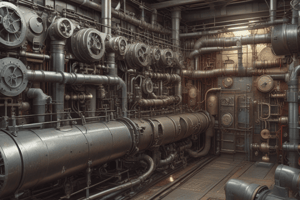Podcast
Questions and Answers
What method was fully developed from the end of the 1940s to the 1950s?
What method was fully developed from the end of the 1940s to the 1950s?
What is the limitation of classical control theory?
What is the limitation of classical control theory?
What are the three control theories commonly used today?
What are the three control theories commonly used today?
What was the result of the availability of digital computers in the 1960s?
What was the result of the availability of digital computers in the 1960s?
Signup and view all the answers
What is the primary focus of this book?
What is the primary focus of this book?
Signup and view all the answers
What was the focus of control design problems from the late 1950s?
What was the focus of control design problems from the late 1950s?
Signup and view all the answers
Why is automatic control essential?
Why is automatic control essential?
Signup and view all the answers
What is included in Chapter 10 of the book?
What is included in Chapter 10 of the book?
Signup and view all the answers
What was the contribution of Ziegler and Nichols?
What was the contribution of Ziegler and Nichols?
Signup and view all the answers
What was the limitation of systems designed using classical control theory?
What was the limitation of systems designed using classical control theory?
Signup and view all the answers
What is the purpose of the book?
What is the purpose of the book?
Signup and view all the answers
What was the focus of control design problems before the late 1950s?
What was the focus of control design problems before the late 1950s?
Signup and view all the answers
Who worked on automatic controllers for steering ships?
Who worked on automatic controllers for steering ships?
Signup and view all the answers
What was investigated from 1960 to 1980?
What was investigated from 1960 to 1980?
Signup and view all the answers
What did Nyquist develop in 1932?
What did Nyquist develop in 1932?
Signup and view all the answers
Who introduced the term servomechanisms?
Who introduced the term servomechanisms?
Signup and view all the answers
Study Notes
Control Theories
- There are three commonly used control theories today: classical control theory, modern control theory, and robust control theory.
Importance of Automatic Control
- Automatic control is essential in many fields, including space-vehicle systems, robotic systems, modern manufacturing systems, and industrial operations.
- It involves control of temperature, pressure, humidity, flow, etc.
Historical Developments of Control Theories
- James Watt introduced the concept of automatic control with his centrifugal governor for speed control of a steam engine in the 18th century.
- Other significant contributors to control theory include Minorsky, Hazen, and Nyquist.
- In 1922, Minorsky worked on automatic controllers for steering ships and demonstrated how stability could be determined from differential equations.
- In 1932, Nyquist developed a procedure for determining stability of closed-loop systems using open-loop response to steady-state sinusoidal inputs.
Development of Frequency-Response Methods
- In the 1940s, frequency-response methods, including the Bode diagram, allowed for the design of linear closed-loop control systems that met performance requirements.
- Many industrial control systems in the 1940s and 1950s used PID controllers to control pressure, temperature, etc.
- Ziegler and Nichols introduced rules for tuning PID controllers, known as Ziegler-Nichols tuning rules.
Root-Locus Method and Modern Control Theory
- The root-locus method, developed by Evans, was fully established by the end of the 1940s to the 1950s.
- Since the 1950s, the emphasis in control design problems shifted from designing acceptable systems to designing optimal systems.
- Modern control theory, based on time-domain analysis and synthesis using state variables, was developed to cope with complex systems and stringent requirements.
Advances in Modern Control Theory
- From 1960 to 1980, optimal control of deterministic and stochastic systems, as well as adaptive and learning control of complex systems, were fully investigated.
- From the 1980s to 1990s, developments in modern control theory continued, focusing on more complex systems.
Studying That Suits You
Use AI to generate personalized quizzes and flashcards to suit your learning preferences.
Description
This quiz covers the analysis and design of control systems based on classical control theory and modern control theory, with a brief introduction to robust control theory.



